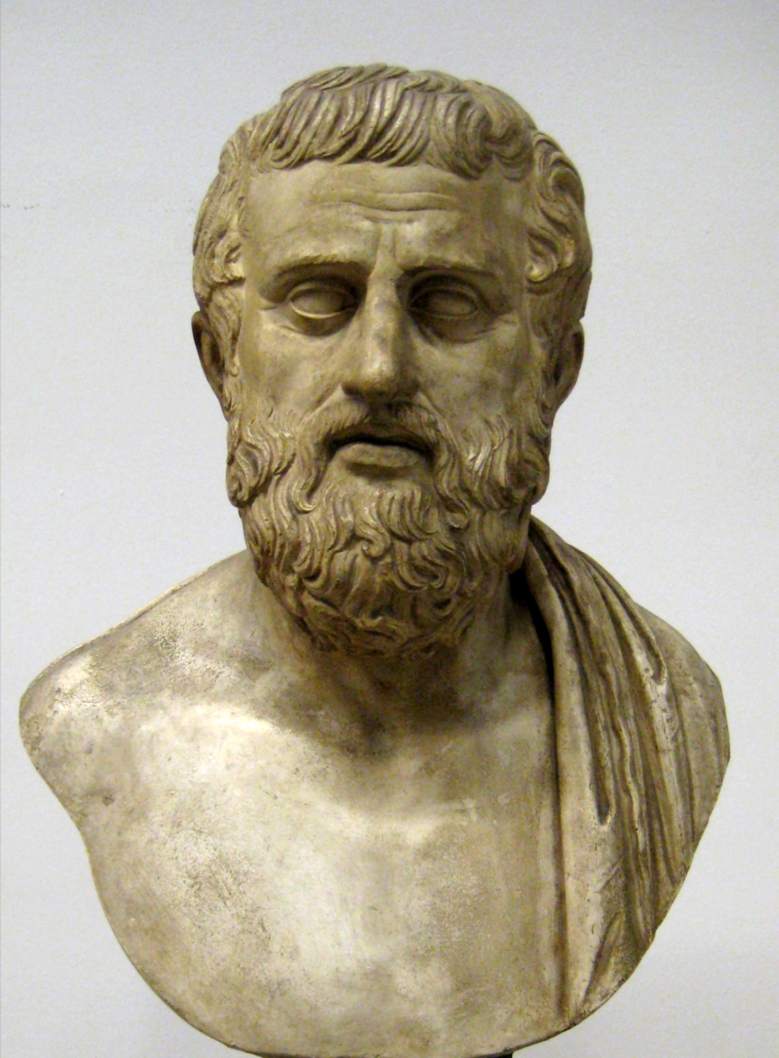

 Sophocles (c. 497/6 – winter 406/5 BC)[2] is one of three ancient Greek tragedians whose plays have survived. His first plays were written later than, or contemporary with, those of Aeschylus; and earlier than, or contemporary with, those of Euripides. Sophocles wrote over 120 plays,[3] but only seven have survived in a complete form: Ajax, Antigone, Women of Trachis, Oedipus Rex, Electra, Philoctetes and Oedipus at Colonus.[4] For almost fifty years, Sophocles was the most celebrated playwright in the dramatic competitions of the city-state of Athens which took place during the religious festivals of the Lenaea and the Dionysia. He competed in thirty competitions, won twenty-four, and was never judged lower than second place. Aeschylus won thirteen competitions, and was sometimes defeated by Sophocles; Euripides won four.[5]
The most famous tragedies of Sophocles feature Oedipus and Antigone: they are generally known as the Theban plays, though each was part of a different tetralogy (the other members of which are now lost). Sophocles influenced the development of drama, most importantly by adding a third actor (attributed to Sophocles by Aristotle; to Aeschylus by Themistius),[6] thereby reducing the importance of the chorus in the presentation of the plot. He also developed his characters to a greater extent than earlier playwrights.[7]
Sophocles (c. 497/6 – winter 406/5 BC)[2] is one of three ancient Greek tragedians whose plays have survived. His first plays were written later than, or contemporary with, those of Aeschylus; and earlier than, or contemporary with, those of Euripides. Sophocles wrote over 120 plays,[3] but only seven have survived in a complete form: Ajax, Antigone, Women of Trachis, Oedipus Rex, Electra, Philoctetes and Oedipus at Colonus.[4] For almost fifty years, Sophocles was the most celebrated playwright in the dramatic competitions of the city-state of Athens which took place during the religious festivals of the Lenaea and the Dionysia. He competed in thirty competitions, won twenty-four, and was never judged lower than second place. Aeschylus won thirteen competitions, and was sometimes defeated by Sophocles; Euripides won four.[5]
The most famous tragedies of Sophocles feature Oedipus and Antigone: they are generally known as the Theban plays, though each was part of a different tetralogy (the other members of which are now lost). Sophocles influenced the development of drama, most importantly by adding a third actor (attributed to Sophocles by Aristotle; to Aeschylus by Themistius),[6] thereby reducing the importance of the chorus in the presentation of the plot. He also developed his characters to a greater extent than earlier playwrights.[7]
An ancient source, Athenaeus’s work Sophists at Dinner, contains references to Sophocles' sexuality. In that work, a character named Myrtilus claims that Sophocles "was partial to boys, in the same way that Euripides was partial to women"[23] ("φιλομεῖραξ δὲ ἦν ὁ Σοφοκλῆς, ὡς Εὐριπίδης φιλογύνης");[24] and relates an anecdote, attributed to Ion of Chios, of Sophocles flirting with a serving-boy at a symposium: βούλει με ἡδέως πίνειν; [...] βραδέως τοίνυν καὶ πρόσφερέ μοι καὶ ἀπόφερε τὴν κύλικα.[25] Do you want me to enjoy my drink? [...] Then hand me the cup nice and slow, and take it back nice and slow too.[26] He also says that Hieronymus of Rhodes, in his Historical Notes, claims that Sophocles once led a boy outside the city-walls for sex; and that the boy snatched Sophocles' cloak (χλανίς, khlanis), leaving his own child-sized robe ("παιδικὸν ἱμάτιον") for Sophocles.[27][28] Moreover, when Euripides heard about this (it was much discussed), he mocked the disdainful treatment, saying that he had himself had sex with the boy, "but had not given him anything more than his usual fee"[29] ("ἀλλὰ μηδὲν προσθεῖναι"),[30] or, "but that nothing had been taken off"[31] ("ἀλλὰ μηδὲν προεθῆναι").[32] In response, Sophocles composed this elegy: Ἥλιος ἦν, οὐ παῖς, Εὐριπίδη, ὅς με χλιαίνων γυμνὸν ἐποίησεν· σοὶ δὲ φιλοῦντι † ἑταίραν † Βορρᾶς ὡμίλησε. σὺ δ᾿ οὐ σοφός, ὃς τὸν Ἔρωτα, ἀλλοτρίαν σπείρων, λωποδύτην ἀπάγεις.[33] It was the Sun, Euripides, and not a boy, that got me hot and stripped me naked. But the North Wind was with you when you were kissing † a courtesan †. You’re not so clever, if you arrest Eros for stealing clothes while you’re sowing another man’s field.[34]
My published books: